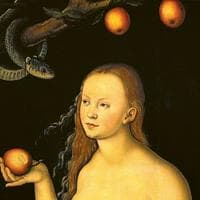Esther (Hadassa bat Avihail) MBTI性格类型
性格
"Esther (Hadassa bat Avihail)是什么人格? Esther (Hadassa bat Avihail)是MBTI中的INFJ人格类型,九型中的6w5 - - 692,五大类型中的RCOAI,Socionics中EII类型。"
Dominant Ni (Introverted Intuition): Esther demonstrates profound foresight and strategic vision. She perceives the long-term implications of Haman’s plot against the Jews and anticipates the outcomes of her actions. Her famous declaration, “If I perish, I perish” (Esther 4:16), reflects Ni’s focus on ultimate goals and destiny over immediate comfort or safety. She envisions a path that protects her people and carefully navigates toward it, showing deep insight beyond surface appearances. Auxiliary Fe (Extraverted Feeling): Esther’s actions are motivated by empathy and the desire to harmonize and protect her community. She negotiates social dynamics with the king and court to influence outcomes in favor of the Jews. Her use of tact, diplomacy, and emotional intelligence, particularly during the banquets where she reveals Haman’s plot (Esther 5:1–14, 7:1–10), demonstrates a strong awareness of others’ feelings and social currents. Tertiary Ti (Introverted Thinking): Behind her emotional and intuitive decisions, Esther applies logical analysis and strategic reasoning. She evaluates risks and plans her approach to the king meticulously, weighing probabilities and consequences. The careful structuring of her banquets and timing of revelations show Ti’s analytical precision supporting her Ni insights. Inferior Se (Extraverted Sensing): While not her strength, Esther can act decisively in the moment when circumstances demand it. Her courage in entering the king’s presence uninvited, breaking protocol at great personal risk, shows her capacity to engage with the immediate physical reality when intuition and empathy demand action. Summary: Esther is a classic Ni-Fe-Ti-Se personality (INFJ) whose visionary insight, empathetic diplomacy, analytical strategy, and situational decisiveness converge to save her people. The Bible portrays her as a leader guided by foresight, moral conviction, and careful orchestration, making her a timeless example of the INFJ cognitive function stack in action. Enneagram (Type Two – The Helper): Esther embodies Type Two through her selfless dedication to her people. She risks her own life to save the Jews, prioritizing the welfare of others over personal safety. Her declaration, “If I perish, I perish” (Esther 4:16), reflects the core Type Two motivation: love and service to others, combined with quiet strength and moral courage. would most likely be EIE (Ethical Intuitive Extrovert, also called ENFj in Socionics/LSE terminology). This fits because she is: Ethical (Fe-dominant): Highly attuned to others’ emotions and motivated by empathy and social harmony. Intuitive (Ni): Visionary, strategic, and focused on long-term outcomes. Extroverted: Engages with society and the court to influence outcomes, despite being introverted in MBTI terms. Judicious/Leader type (LSE aspects): Uses structure and diplomacy to achieve moral and social goals. Moral Alignment (Lawful Good): Esther acts in accordance with both societal law and divine moral law. She does not seek personal gain but meticulously works to uphold justice and protect life. Her careful planning, ethical courage, and commitment to the welfare of her community align with the lawful good archetype. Integrated Summary: Esther is a visionary strategist and compassionate leader whose Ni-driven foresight allows her to perceive danger and opportunities before others. Her Fe motivates her to act with empathy and diplomacy, while Ti ensures her actions are logical and effective. Se empowers her to act decisively in high-stakes moments. As a Type Two, she is selfless, loyal, and motivated by service, embodying a socially conservative respect for tradition and hierarchy. Her lawful good alignment cements her as a morally principled, courageous figure. The Bible portrays her as a model of wisdom, courage, and moral integrity, demonstrating how intellect, heart, and strategic action can converge to effect profound change (Esther 4–7).
背景
Esther is described in all versions of the Book of Esther as the Jewish queen of a Persian king Ahasuerus. In the narrative, Ahasuerus seeks a new wife after his queen, Vashti, refuses to obey him, and Esther is chosen for her beauty. The king's chief adviser, Haman, is offended by Esther's cousin and guardian, Mordecai, and gets permission from the king to have all the Jews in the kingdom killed. Esther foils the plan, and wins permission from the king for the Jews to kill their enemies, and they do so. Her story provides a traditional background for Purim, which is celebrated on the date given in the story for when Haman's order was to go into effect, which is the same day that the Jews killed their enemies after the plan was reversed.
















